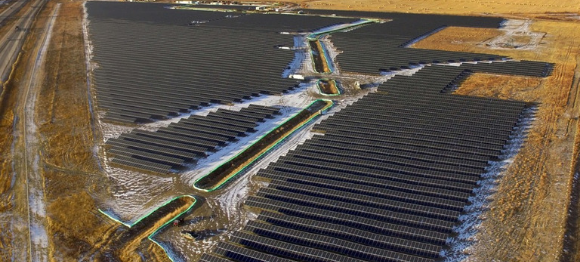
Snapshot of Elemental Energy: how a virtual power purchase agreement made Alberta’s first utility-scale solar project possible
You’ve likely heard that virtual power purchase agreements (VPPAs) are gaining traction in Canada as a reliable way for companies to source renewable energy. But what exactly does it take to get one off the ground? At Bullfrog’s Sustainability Snapshot event in Calgary, Jamie Houssian, Principal of Elemental Energy, spoke about his experience bringing the first utility-scale solar project in Western Canada online.
Elemental Energy is a Vancouver-based company that invests in, develops, and manages renewable energy projects across Canada. They own and operate wind farms in Nova Scotia and Newfoundland, a run-of-river hydro plant in British Columbia, and the groundbreaking Brooks Solar Project in Alberta.
The Brooks Solar Project’s 49,000 solar panels are set alongside the Trans-Canada Highway, making it a particularly high-profile project in a province where renewable energy isn’t always top-of-mind.
“It’s not about revolutionary technology,” said Jamie. “It’s about coming into a place like Alberta and showing that this can happen here—here’s how you do it, you figure out all the permits, and how to build, and the supply chain, and all that stuff.”
Constructing the Brooks Solar Project took seven months, used lots of local labour, and indirectly supported local businesses. “The Pita Pit did super well while we were under construction,” Jamie laughed.
To help finance this ambitious project, Elemental Energy signed a virtual power purchase agreement with Telus. They acted as a corporate offtaker, or buyer. Offtakers have acquired much of North America’s renewable energy in recent years. “The traditional model is for a generator to sell renewable power to a utility,” Jamie said. “But now, and Bullfrog knows this well, a lot of corporations are interested in procuring directly from a specific renewable energy facility.”
Telus secured the credit necessary to finance the 17 MW plant—a prime example of how VPPAs benefit both the buyer and the developer. Jamie added that financing was one of the main benefits of corporate involvement in renewable energy projects. Meanwhile, the corporation enjoys communications benefits and potential cost savings.
Jamie noted that the legalities of a VPPA can take a lot of time, money, and energy to navigate. “People always ask about the price, but a lot of it has to do with the intricacies of performance security and layers of credit,” he said. When the power pool price is lower than the pre-determined VPPA price, the buyer will top up the project owner. When power pool prices are high, the project owner pays the buyer. Click here for a more detailed explanation of virtual power purchase agreements.
Jamie’s advice for developers looking to sign VPPAs was to find a quarterback within the organization—someone to be your advocate and to help push things forward. You’ll then want to build a team around that quarterback, as you’ll end up working with departments including finance, sustainability, and construction. The process may be complex, but the end result is helping to green Canada’s energy grid in a concrete, measurable way.
“We were happy to play a small part in the growth of renewables in this province, and we’re excited to announce that we’ll be breaking ground on another project next week,” Jamie added. “We’re looking forward to bringing even more renewables to Alberta.”
Curious about how a virtual power purchase agreement could help your business reach its sustainability goals? Contact us at business@bullfrogpower.com or fill out the form below.